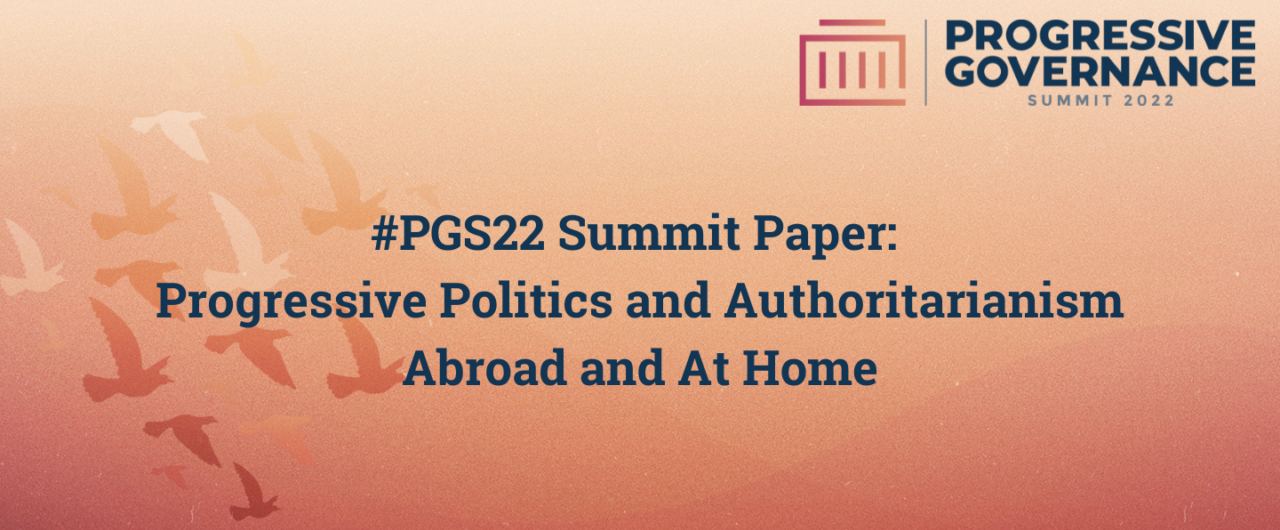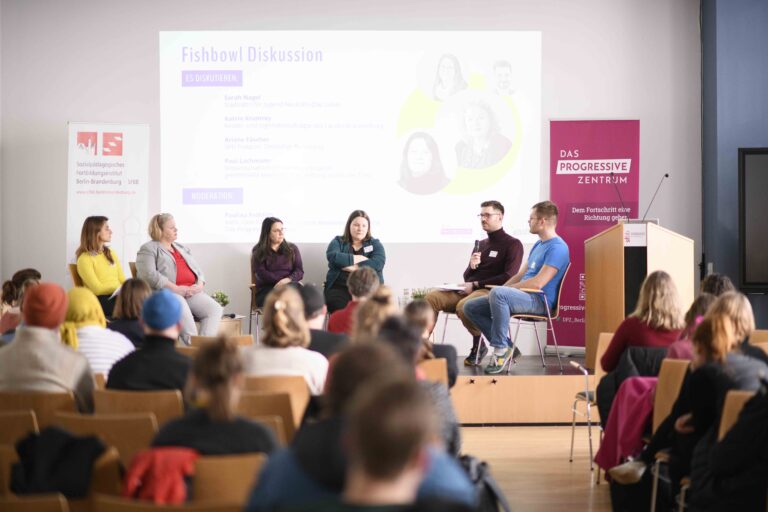Europe and the United States find themselves in an entirely new social and geopolitical situation. The global crisis of declining biodiversity and climate change requires a fundamental transformation of our economic systems. High living standards in wealthy countries are based on extensive use of fossil fuels, land, and raw materials. Fighting climate change and preserving biodiversity will require changing our production models, lifestyles, consumption, and mobility. It requires high investment in new technology and infrastructure. It also requires more respect for needs of the global South. The current food crisis is just the latest indicator that business as usual is no longer an option.
This challenge of transformation comes at a difficult time. There is reason to be concerned about the integrity and viability of major Western democracies over the next two or three decades. Populism and authoritarianism have damaged political and cultural institutions considerably. Even strong democracies such as the United States and the United Kingdom have seen blatant abuses of government power, while others have lived through massively declining levels of trust in their institutions.
In the U.S., the Trump years have laid bare the limits of the resilience of institutions, traditions, and decision-makers alike. For the first time in recent memory, authoritarian worldviews have successfully established themselves at the center of Western middle classes and can create political majorities. In the recent French presidential election, the far-right candidate again came second in the first round and closed the gap with Macron compared to 2017. The recent Swedish and Italian polls have only reinforced that concerning scenario.
The dual challenge of transformation and the authoritarian threat force progressives to rethink their approach and constituencies radically. It is necessary to focus on new alliances at home and abroad to define a clear future-oriented project. These include a renewed transatlantic alliance to lead transformative change, open to actors in other regions. It must be based on democratic values and address anti-democratic forces domestically and abroad. Restoring and protecting democracy in the West is fundamental for achieving the transformation towards a sustainable future.
What has happened in the West?
For the last three decades, a global commercial one-world has formed, penetrating every corner of the earth. It resulted in structural tensions between border-crossing economies and the limited reach of nation-state power to address current challenges. The new economic world order is liberal, and market-driven. It has lifted millions out of poverty but made markets and societies more prone to crises. Therefore, many feel increasing vulnerability in everyday life. The fiscal turmoil wiped out savings for millions of citizens, and the pandemic has hurt children, young people, the elderly, and those needing care. In addition, climate change affects communities, and the onset of the war in Ukraine has prompted higher cost-of-living expenses with exploding energy prices and double-digit inflation rates.
Rising economic insecurity is part of the explanation but is insufficient to address prospering Western societies’ authoritarian turn. Take the situation in the United States as an example: Over 60 million middle-class Americans voted for Donald Trump in 2020 – their incomes ranging from $60,000 to over $200,000, providing considerable economic safety. As the past two years of the Biden administration have proven: Their turn away from constitutional and democratic traditions cannot be successfully addressed with social or fiscal policies alone since the disenchantment with modernity reaches deeper.
Open and diverse societies upset traditional hierarchies and lifestyles. The drive for equal opportunities for women in Western societies threaten the position of men at home and the workplace. Demands of ethnic minorities and migrant communities for better participation and less discrimination also undermine the dominant social hierarchies in politics and business. In many communities, immigration, equal opportunity but also the acceptance of queer lifestyles are perceived as attacks on their life choices. Thus, it is vital to recognize how educated and prospering middle classes develop and justify their undemocratic worldviews. In the U.S., Donald Trump’s rhetoric of middle-class victimization resonates with countless voters, and the Democratic party has struggled to find a successful counterstrategy. To different degrees, Canada and Europe see similar shifts.
The limits of liberal values in the East
The common expectation that the fall of the Berlin Wall would strengthen and globalize enlightened liberal traditions and become the only remaining political model did not materialize. Instead, after a short spring of democratization across the globe, many states fell into disarray and became susceptible to nationalist movements and reconfigurations. (Since the mid-1990s, a dozen governments have shifted from democratic to authoritarian.)
Ivan Krastev coined the term “imitation imperative” for how Central and Eastern Europe approached the West. Imitation of Western institutions and attitudes were predominant in the first decade after the fall of the Berlin wall. The consequences of imitating the West were the denial of the region’s history and uniqueness. Imitation is not the original and many democratic processes and liberal values are more a foreign façade than expression of the liberalization that occurred in 1989. Moreover, eastern European societies are more traditional and conservative than those in the liberal west after 70 years of uninterrupted modernization. Consequently, populations in these regions are receptive to the anti-modernization propaganda of populist and authoritarian leaders. Anti-Western and anti-modernist campaigns in the east (but also in the U.S.) are fueled by caricature of Western hedonistic lifestyles and misogynist stereotypes.
Authoritarian politics have an easy prey in an environment of weak institutions and increasing prejudices and stigma of liberal values. Eastern and western authoritarian politics find common grounds in their opposition of the liberal west.
The Global Context
There is an international dimension to these developments, given the systematic interference by authoritarian elites from Russia or China in Western media, universities, political parties, and elections: Authoritarianism in other regions of the world directly and negatively impacts liberal democracies in the West.
Russia’s repeated invasions in Ukraine and the Chinese appeasement of this aggression directly result from lacking checks and balances in these societies. The war in Ukraine is not only destabilizing European borders and institutions. Russia has also made hunger and starvation weapons of war, de facto taking hostage millions of Africans. (As a result of the war and the food crisis, over eight hundred million people suffer food insecurity. If only ten percent do not survive this catastrophe, we will witness numbers of victims like those of the Second World War).
For Europe, and particularly for Germany, there must be no doubt that ‘equidistance’ vis-a-vis Russia and the United States is not a viable path. Despite the many faults of military interventions in Iraq and Afghanistan led by the U.S., the authoritarian nature of China and the unprovoked attack by Russia on Ukraine make comparisons and even attributing the situation to the U.S. unacceptable. In an increasingly multipolar world, a renewed transatlantic partnership provides crucial protection against authoritarianism.
However, legitimate criticism of U.S. foreign policy is another reason for actors like Germany or Canada to take on leading roles in an international anti-authoritarian collation. Establishing real power is the prerequisite to reforming the militaristic tendencies of U.S. policy and forging a new direction for the transatlantic alliance. The current political moment offers that opportunity: In addition, the necessary public debates to push back against Russian and Chinese authoritarianism might find more political support than addressing authoritarian worldviews of domestic segments of society without this international context. In other words: Countering the advance of the illiberal energies of China and Russia will help discredit illiberal forces at home.
Europe must lead in that alliance, not just a passenger on America’s coattails. The task of our time is to drive the transatlantic partnership in a new direction that stabilizes democracy and makes the social and environmental progress our era demands.
The transformation of politics
We are faced with multiple crises that transform politics in three fundamental ways: First, populists and the far right successfully exploit economic concerns and campaign against liberal democracies. Second, decreasing trust in state institutions results in the increasing erosion of these organizations themselves. (Parliaments, the judicial system, state authority, and the government at large). Third, the loss of truthfulness in public discourse accelerates these developments, and so do the echo chambers of social media.
These developments are interconnected. Populist politicians use the weakness of institutions and false information to organize discontent and hatred. As elected leaders, they further undermine institutions and public discourse. Consequently, believing President Biden’s (or any other progressive) electoral victory would quickly overcome the populist threat is an illusion.
Progressives had long hoped that good policy would restore trust and institutions. Managing climate change and adapting to a new social environment based on reasonable policies is essential. Nevertheless, there is little evidence that good governance alone can restore trust and truthfulness and stop a shift toward the authoritarian right: Currently, progressive leaders struggle to achieve political support despite comprehensive policy packages to protect societies from the pandemic or rising energy prices.
How to form an alliance against authoritarianism and for a just transition
The current generational shift in European and U.S. politics offers a significant challenge and a great opportunity. Previously, breakthroughs in the political culture of western societies emerged through new generations: the anti-Vietnam war protests in the U.S. and the 68 rebellions in Western Europe. Young generations rejected the lifestyles and myths of their parents and forcefully demanded change. Today, environmental and social justice movements speak for a generation whose lives will be less comfortable than their parents. Progressive leaders should embrace their voices and make them part of a future-oriented, enlightened transatlantic conversation about democracy, anti-authoritarianism, and social change.
As a flip side, this means the acceptance of the right to communities to live traditional lives and not be pressured to modernize at all costs. Modernization is a process from within and cannot be forced from the outside. Moreover, it is our modern way of life that has the highest energy consumption. Liberal and progressive societies should be tolerant of other ways of life much more than they have in the past. This includes the increasingly violent culture wars on language (for instance in the fields of gender or race) or cultural appropriation. Progressive should aim to build bridges between young campaigners for change and those who are rooted in local communities.
This is easier said than done, given the apparent tension of convincing a new generation to be the vanguard of new domestic and a renewed transatlantic alliance. Considering widespread antipathy to the United States, a bargain or a compact is needed; therefore vital generational issues like environmental or social justice must be part of future transatlantic conversations. However, such an agenda on its own is not sufficient to prevail either domestically or internationally. To make progress on core issues of a new generation, it is urgently necessary to drive forward a broad alliance with other opponents of authoritarian forces to counter China and Russia internationally and their aligned illiberal forces at home.
An important element of this new conversation is a focus on the core elements of democratic values. It is necessary to clarify what defines the core principles of the rule of law, in particular the separation of powers, judicial independence, and the freedom of the press, to have a clear demarcation line of democratic and authoritarian rule. The EU’s Charter of Fundamental Rights can serve as a guide in this discussion. It is important to clear the muddied waters of what the red lines of authoritarianism are and when they are crossed. This applies to liberal democracies in the West but even more so to illiberal regimes in Hungary, Russia, and China. This requires an open and well-informed public debate – and here, the concentration of the media industry and the largely unregulated nature of social media is a point of concern. This also includes a push back against authoritarian influences in liberal societies. There have been systematic forms of disinformation by authoritarian regimes in the form of cultural centers (Confuzius Institutes) and television programs (Russia Today) which should be monitored closely. Putin’s role in the election of Trump might have been overstated but there should be no interference by authoritarian regimes in democratic elections.
The Russian invasion in Ukraine has put the value of liberal democracies on the agenda. It reminds progressives of what is at stake. At the same time, the coming winter will also test the commitment of the west to its core values. Progressives should accept the challenge and commit clearly that they can protect their citizens from economic hardship and stick to their principles. This requires focusing on the core of democratic values and allying with those whose future is at risk.






